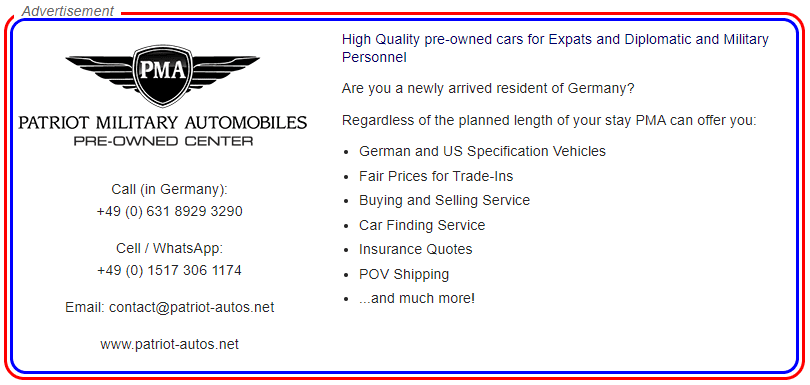The car-buying experience in Germany can be both exciting and daunting. It can be exciting because there is a very wide number of manufacturers to choose from. It can be daunting because car prices tend to be higher and the whole thing has to be handled in a strange language. But take heart. It is not really that much different from buying a car at home and there are even some manufacturers that offer special programs designed with expatriates in mind.
Whether you buy a new or pre-owned (used) car depends on your circumstances. How long will you be over here? How much money do you want to spend? How many kilometers do you drive? What sort of driving do you do (more autobahn than city driving)?
New Cars (Neuwagen)
There are plenty of sources to help you decide what car you wish to buy, including, among others, television commercials, newspapers, auto magazines and the ubiquitous internet sites. No matter where you get your information, it is most likely that you will eventually end up in a dealership to finalize the deal and drive off with your new set of wheels. You can usually find someone at the showroom who speaks English, and German law generally prohibits the freewheeling bargaining that is so common in other countries. So, in theory, what you see on the sticker is what you should have to pay for the car.
There are still some ways of getting the price down. Dealers sometimes give discounts for payment in cash. Some dealers register cars for a day and then immediately deregister them. This turns them into “used cars”, giving flexibility in pricing. There is also room for negotiation when it comes to the “extras”; sunroof, air conditioning, sound system and other accessories. Another way to lower the cost of a new car is to make sure the dealer gives you a very good price for your trade-in.
If you don’t pay cash for a new car (and not many people do) then you will have to finance it. Many manufacturers offer internal finance programs, usually at a slightly better interest rate than a bank. But it pays to check out both possibilities. Interest rates may be better with the manufacturer but the loan may have to be paid back in three years, and you probably can’t expect financing for a car that is discounted in any way. Depending on the price, financing can range from 24 to 60 months. The best interest rates are offered when a 20 percent down payment is made.
Read about motor vehicle registration, inspection and taxes here.
Pre-owned (Used) Cars (Gebrauchtwagen)

Pre-owned cars can be a good value if you shop carefully. If you buy a used car through a dealer you can normally expect some sort of guarantee. (According to the German “lemon law”, dealerships must honor a limited one-year warranty for all used cars they sell. They are responsible for defects that are present at the time of sale but not those that result from regular wear and tear or negligence. Defects are normally determined by a third party appraiser.) Some banks and even some dealers may finance used cars, but this is not as easy as with a new cars. Factors such as odometer reading (mileage), age and value are involved.
There are a number of pre-owned car dealerships in Germany that cater to English speakers and have native English speakers to help you throughout the procedures. Some of these dealerships have years of experience in selling cars to the US and British military forces and are well versed in all of the intricacies regarding customs, taxes, inspection, registration, insurance and other factors important to an expat. You can explore their inventory online and arrange a purchase with them directly.
Good deals can be found if you check into buying a Jahreswagen or a demo model (Vorführwagen). Employees of car manufacturers are allowed to buy cars at a discount and can resell them after keeping them a year (hence the term Jahreswagen.) Normally these cars are in quite good condition and a good value for the money. A Vorführwagen has usually been displayed in the showroom and used for test drives. It’s usually in good condition and has low mileage.
If you’re adventurous and want to buy a used car from a private owner, the newspapers are full of ads and there are plenty of sites online. The key things to look for in the ads are odometer reading (mileage), date of the next inspection (TÜV), date of first registration (Erstezulassung or EZ), model year, type of catalytic converter and number of owners. It is wise to observe the normal precautions when buying a used car privately. In general, though, Germans take good care of their cars and you may find what you want for a good price. It is always good to get a contract when you buy a car. There are boilerplate contracts available.
Read more about vehicle insurance here.
When you buy a car from a dealer, whether new or used, you can expect help in the registration and insurance areas. If you buy a car privately you will have to do these things yourself. You’ll need proof of insurance and proof of ownership of the car (Kfz-Brief). You’ll have to take these to the local motor vehicle department (Kfz-Zulassungstelle), and if everything is in order you’ll be given your license plates.
Buying a car Online is becoming more and more popular – as well as easier. The advantages of doing this are obvious. You don’t have to go to a dealership, the selection is vast and it’s possible to search for a car according to a large number of different criteria. The website http://eng.autoscout24.com/index.asp?language=ger offers the online user the opportunity to search for cars in Germany in English..
Some Common Words and Abbreviations You May Encounter and What They Mean in English
Types and Condition of a Car
| Neuwagen | new car |
| Gebrauchtwagen | pre-owned (used) car |
| Combi | station wagon/estate wagon |
| Cabrio | convertible |
| Kraftstoffe | fuel-diesel or gasoline/benzin |
| Kilometerstand(KM) | mileage/odometer reading |
| Erstzulassunf (EZ) | date of first registration usually month and year |
| Reifen | tires, usually followed by size and designation as summer, winter or all season tires |
| AWD, Allradantreib | 4 wheel, all wheel drive |
| HU/AU/TüV | safety and emissions inspections- usually followed by due date month and year |
| Hubraum (ccm) | engine displacement in cubic centimeters |
| Leistung or PS/kW | engine power designations by horsepower or Kilowatts – 1 PS = 0.753 kW |
| Manuel getriebe 5 gang | 5 gear standard transmission |
| Automatik getreibe | automatic tranmission |
| Katalysator | Catalytic converter |
| Türen | doors, usually followed by a number, hatchback type cars may have 3 or 5 doors |
Various features and accessories
| ABS | Anti skid braking |
| ACC | Cruise control |
| Alu-felgen | Aluminum wheel rims |
| Anhängerkupplung | trailer hitch |
| Dachträger | roof rack fixtures |
| Einparkhilfe | electronic parking assistance |
| Elektrische Fensterheber | electric windows |
| Elektrische verstellbar Aussenspeigel | Electrically adjustable rear view mirror |
| Klimaanlage, Klima-Automatik | Air conditioning, automatic climate control |
| Navi | Navigation system |
| Nebelscheinwerfer | fog lights |
| Schiebedach | sun roof |
| Servolenkung | power steering |
| Sitzheizung | heated seats |
| Zentralverriegelung | central locking |
Auto Insurance
Before a person can register a car in Germany he or she must have proof of third party liability coverage for all damage or injury to another person, car or object. While collision or comprehensive insurance isn’t required by law, most institutions financing the purchase of a vehicle do require it. This can raise the insurance bill considerably, and insurance is not cheap in Germany.
There are numerous factors in addition to coverage that influence the insurance price. Beginning drivers pay more than experienced drivers; those driving big, powerful cars pay more than those with more modest vehicles; those living in urban areas pay more than those in rural areas, and those who have been found liable in accidents pay more than those who haven’t.
If you have a good driving record in your home country you can get credit for it here. Get a letter from your insurance agent back home. If the German agent says you can’t get this credit try another agent.
There is no requirement for a driver to have any but third party liability insurance, but others kinds are available and sometimes advisable. There is full comprehensive, covering all damages or injuries done to your own car, another car or a person or object. There is also partial coverage for fire, theft and other sorts of damage (from break-ins, shattered glass, animals, etc.), and policies covering the death or disability of a passenger. Such policies often have deductibles, meaning you must swallow the cost up to a certain upper limit. These make the insurance less costly.
Rental agencies and institutions financing the purchase of a car often make some sort of collision insurance a condition of the transaction.
Several insurance agents in Germany are geared to getting the expatriate through these complexities. (See our Resources data base) Your agent will issue you, free of charge, an International Green Card as the proof-of-insurance document you need to drive in other European countries.
Liability Insurance Terms
| Abschätzung des Schadens | appraisal of damage |
| Beitrag | premium |
| Kraftfahrzeug | motor vehicle |
| Kraftfahrzeug- versicherung | automobile insurance |
| Pflichtversicherung | compulsory insurance |
| Reparaturkosten | cost of repair |
| Sachschaden | property damage |
| Schaden | damage |
| Totalverlust | total loss |
| Unfallentschädigung | accident indemnity |
| Versicherungszertifikat | certificate of insurance |
| Vollkaskopolice | comprehensive policy |



























